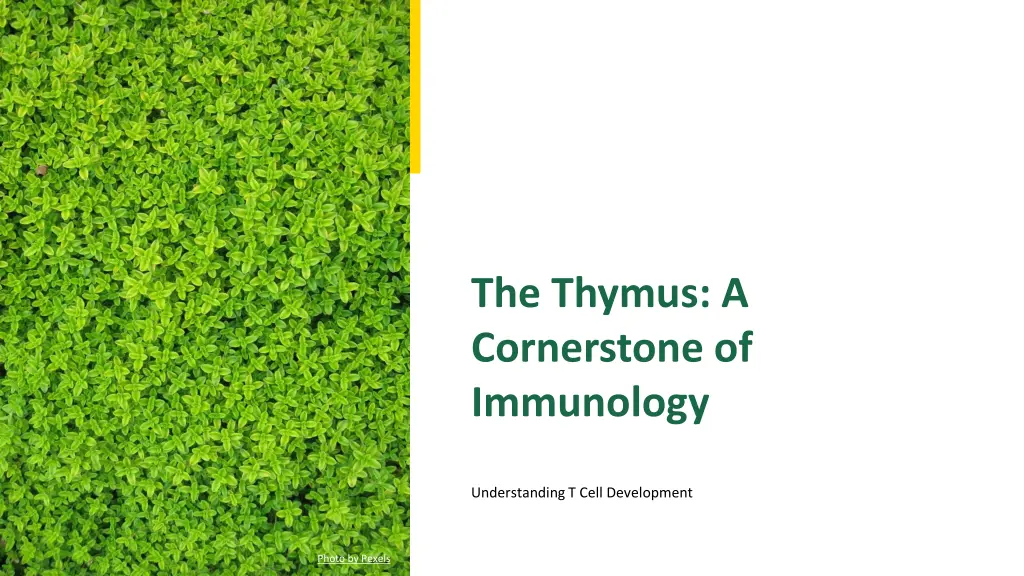
The Thymus: A Cornerstone of Immunology Understanding T Cell Development
Explore the vital role of the thymus gland in T cell development and immunology. Delve into its anatomy, thymocyte maturation, and the significance of Hassall's corpuscles. Discover how the thymus shapes our immune system and impacts health and disease.
Download Presentation

Please find below an Image/Link to download the presentation.
The content on the website is provided AS IS for your information and personal use only. It may not be sold, licensed, or shared on other websites without obtaining consent from the author. If you encounter any issues during the download, it is possible that the publisher has removed the file from their server.
You are allowed to download the files provided on this website for personal or commercial use, subject to the condition that they are used lawfully. All files are the property of their respective owners.
The content on the website is provided AS IS for your information and personal use only. It may not be sold, licensed, or shared on other websites without obtaining consent from the author.
E N D
Presentation Transcript
The Thymus: A Cornerstone of Immunology Understanding T Cell Development Photo by Pexels
01 Introduction to the Thymus Table of Contents 02 Anatomy of the Thymus 03 Lobular Configuration 04 Thymocytes: The Key Players 05 The Role of Hassall s Corpuscles 06 Hormonal Influence 07 T Cell Development Process 08 Thymus-Related Pathologies 09 Importance of Thymus in Immunology 10 Thank You!
1 Introduction to the Thymus Vital Immune Organ The thymus gland, a crucial organ, is located in the upper front of the chest, behindthe sternum. It plays a significant role in the immune system, particularly in the development of T lymphocytes or T cells. Understanding its structure helps to appreciate its essential functions in immunology. This presentation explores the thymus's biology, T cell development, and the implications for health and disease. Photo by Pexels
2 Anatomy of the Thymus Location & Structure Shaped like a triangle, the thymus is pinkish-gray and weighs 10-15 grams at birth. Its growth continues until puberty, making it unique among glands. The thymus is divided into lobules separated by septa, housing crucial immune cells. Let's delve deeper into its internal architecture to understand its functions better. Photo by Pexels
3 Lobular Configuration Understanding Lobules The thymus contains two lobes, each enveloped by a capsule, enhancing its structure. Internally, the lobes are subdivided into lobules, facilitating specialized activity. The outer cortex is dense with thymocytes, while the inner medulla showcases Hassall s corpuscles. Each part performs distinct roles in the maturation of T cells. Photo by Pexels
4 Thymocytes: The Key Players T Cell Precursors The cortex of the thymus is packed with thymocytes, essential for T cell development. These precursors undergo rigorous selection processes, critical for functional immunity. Understanding thymocyte maturation is pivotal for grasping how T cells respond. This process ensures a capable immune system ready for action. Photo by Pexels
5 The Role of Hassall s Corpuscles Medullary Structures In the thymus, Hassall s corpuscles play an important role in T cell maturation. These concentric structures contribute to the education of T cells, influencing their fate. Their presence highlights the complex events occurring in the medulla. Exploring their function furthers our understanding of T cell biology. Photo by Pexels
6 Hormonal Influence Thymic Secretions The thymus secretes hormones known collectively as Thymosins, critical for immune function. Key derivatives include Thymulin, Thymosin 1, and Thymopoietin, each with uniqueroles. These hormones facilitate T cell maturation and immune response readiness. Hormonal regulation is vital for maintaining a balanced immune system. Photo by Pexels
7 T Cell Development Process From Precursors to Function The development of T lymphocytes involves rigorous processes, ensuringself-tolerance and functionality. Positive and negative selection processes occur in the thymic environment. Understanding this journey is fundamental for aspiring healthcare professionals. T cells are essential for adaptive immunity, highlighting the thymus's significance. Photo by Pexels
8 Thymus-Related Pathologies When Things Go Wrong Disruptions in thymus function can lead to immunodeficiencies or autoimmune diseases. Conditions like DiGeorge syndrome showcase the thymus's critical role in immunity. Understanding these pathologies emphasizes the thymus's importance in health. This sheds light on potential therapeutic avenues for thymus- related diseases. Photo by Pexels
9 Importance of Thymus in Immunology Summarizing Key Points The thymus is crucial for T cell development and the overall immune response. Its anatomy and physiology are central to understanding immune function and health. This organ's role emphasizes the intricate connections in immunology.</bodyContent4':'As future healthcare providers, mastering these concepts is essential for effective patient care. Photo by Pexels
10 Thank You! Questions? Thank you for engaging with this presentation on the thymus and its vital role in immunology. We hope it has enriched your understanding of T cell development and the thymus's functions. Feel free to ask any questions or share your thoughts. Together, let's continue exploring the fascinating world of immunology! Photo by Pexels
